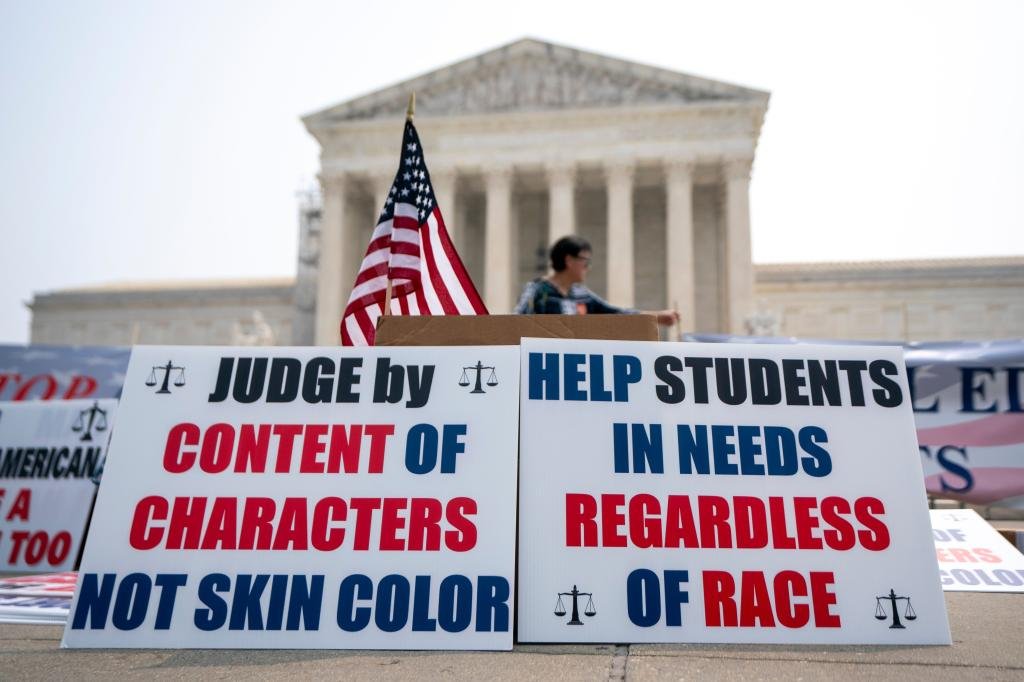The Supreme Court Should Enforce “Ban the Box” Policy to Prevent Racial Identity Discrimination in Colleges’ Selection Process

Legend had it that whoever untied the impossibly convoluted Gordian Knot would rule the world.
Facing the intractable challenge, young Alexander the Great took out his sword, cut the Knot and went on to conquer the largest empire to date, spanning Greece, Egypt and India.
We have a Gordian Knot today — in the form of the murky college-admissions environment that followed the Supreme Court ruling in Students for Fair Admissions v. Harvard.
The ruling was plain enough: Students must not be treated in any way on the basis of race in admissions; that amounts to unconstitutional racial discrimination.
Yet the ruling set off a woke storm.
The White House blasted the ruling (though President Joe Biden never explained what about it exactly ticked him off), and Harvard immediately redid its upcoming admissions application form to help get around the order: Its first essay prompt now asks applicants how their “life experiences” shaped them in view of Harvard’s recognition of the importance of a “diverse” student body.
Expect the multibillion-dollar Diversity, Equity, Inclusion industrial complex to rack its brains finding schemes to circumvent the SFFA ruling.
DEI racketeers’ continued prosperity depends on their tenacity to subvert Chief Justice John Roberts’ dictum that the way to stop discriminating on the basis of race is to . . . stop discriminating on the basis of race. They’ll be searching high and low for ways.
Sure to come, then, is an unending stream of increasingly complex and stealthy schemes resulting in multitudes of expensive legal actions sure to keep lawyers busy for decades — all while allowing colleges to continue their racial discrimination.
The Supreme Court has a choice.
It can allow itself to be trapped into a war of attrition with the DEI establishment, and labor to unravel each and every twisty, stealthy scheme, now and to come, each with its double-speak, code words and plausible deniability. That would suit the DEI folks just fine.
Or, it can whip out a mighty sword and cut the Gordian Knot — by asking why colleges have a race checkbox in the first place.
Many colleges don’t ask for SAT/ACT scores any longer, because they say they fear triggering “implicit racial bias.” (They actually think the existence of scores data would add pressure to admit kids based on race-blind merit.)
They don’t ask for applicants’ (your child’s future roommates?) criminal history any longer, because, again, they say they fear triggering “implicit racial bias.”
Yet they explicitly ask for race?
If they aren’t doing racial engineering, why track racial-engineering performance?
Might there be a legitimate need for colleges to collect self-identified racial information?
That’s hard to imagine. For starters, self-identified race is hoax-ridden, with 34% of white college applicants pretending to be “minority,” per one study.
Furthermore, racial categories, in truth, have neither biological nor cultural validity, with neither “Asian,” nor “Hispanic,” nor “black,” nor “white” describing anything in common without engaging in at best ignorant and at worst toxic stereotyping.
Still, granting a theoretical possibility for a legitimate (constitutional) need, the Supreme Court could allow the collection and use of racial information, but it should subject such policies to the high legal standard of strict scrutiny.
That means colleges — and their regulators and suppliers — that want to collect or use such info may do so, but they must show that:
- They have a legitimate need for it that cannot be fulfilled another way.
- The use of racial information effectively addresses the stated need in a precise and measurable way.
- The need (and policies) have an end date declared in advance.
- The schools have put safeguards in place to ensure the racial information is used only for the stated need and duration.
This is precisely what the Chinese American Citizens Alliance-Greater New York asked the Supreme Court to consider in the amicus brief it filed Friday, along with eight other educational partners, asking the justices to hear an appeal by parents of Virginia’s Thomas Jefferson High School in their lawsuit against their school board for racial discrimination against Asian students.
Such conditions would ensure that colleges follow the plain order in the SFFA ruling —that “what cannot be done directly cannot be done indirectly.”
Wai Wah Chin is the founding president of the Chinese American Citizens Alliance-Greater New York and an adjunct fellow of the Manhattan Institute.




